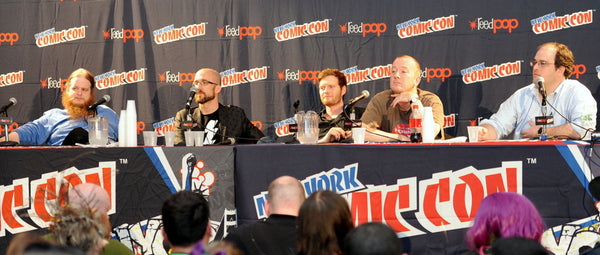
Quite a few Crossed creators were in attendance at NYCC recently, where a few interesting tidbits were revealed -- about Alan Moore's Crossed+100, Kieron Gillen's Crossed: Badlands arc, upcoming Crossed from Si Spurrier and Justin Jordan, and so much more. Bleeding Cool EIC Hannah Means-Shannon got the inside word on much of this for Bleeding Cool Magazine #13 (on sale soon), but meanwhile, here's a taste of what Garth had to say about Crossed: Dead or Alive:
Hannah Means-Shannon: Crossed seems to operate on a number of different levels depending on who is writing it and what their goals are. There’s the overt horror aspect, but also a psychological depth possible when examining humans facing extreme conditions. What are your strategies for getting readers inside the minds of survivors in Dead or Alive?
Garth Ennis: That will vary from story to story. You’ll see one character have to cope with a loved one turning Crossed. You’ll see another watching the rest of his family struggling and failing to deal with the same thing. Yet another will be confronted with a situation that leaves him utterly helpless to look after his loved ones. And then you’ll see a couple who don’t directly encounter the Crossed at all, but have to face up to what this grim new world means for them and their relationship, and causes one of them to question it.
Hannah: Dead or Alive seems like it might have quite a large cast of characters. How does this add to the type of story you want to tell? Is this so readers can see various personality types in action?
Garth: Not so much different personalities as different kinds of stories, although one certainly informs the other. I wanted a suspense story, a military action story, a relationship story. Of course, all six webisodes will involve relationships of one kind or another, but even within that you have some interesting variations. The elderly couple with a love that’s lasted a lifetime, the younger couple with the tempestuous marriage, and the pair that are thrown together by circumstances. The latter are part of a particularly interesting little tale, in which each makes drastically different assumptions about their nature of their relationship. Exactly the kind of grey area I like to explore.
Hannah: Is one of your goals in Crossed to make the reader think, “What if I was there? What would my own story be like?”
Garth: Very probably. Working in a medium wherein the notion of heroism, for instance, is usually expressed in a remarkably obvious and simplistic way, it’s interesting to take a look at real life situations and see how genuine human behavior contrasts with the fictional. In real life you often get scrappier, more random expressions of the heroic tendency that don’t necessarily resolve a given situation to the extent desired, or that make things worse, or that are sometimes abandoned when the threat to the would-be hero intensifies.
Allied to that is the idea of people taking charge as a means of resolving said situation, which of course contains its own perils, particularly if what’s happening is not fully understood. That’s something else that superhero comics rarely address, because once the good guy shows up and gets stuck in, he need only overcome a series of setbacks and pitfalls and the status quo will be reestablished. What sometimes needs to be understood is that things have changed so radically that simple repairs won’t cut it, and a new status quo must be established and maintained: e.g. the various quagmires a number of middle-eastern countries have descended into.
Now apply either of these ideas to Crossed. How heroic can you be in the face of an onrushing tidal wave that carries all before it? And how do you take charge of pure chaos? At what point does it occur to you to abandon these fondly-held principles and run, and how do you mentally process that afterwards?
Hannah: Are there positive aspects of human behavior possible as a theme in Crossed? Are there likely to be any in Dead or Alive?
Garth: I think that’s been a pretty strong theme running right through Crossed, going all the way back to Stan and Cindy’s conversation in the ruined church in the last part of the original series. In my first Badlands arc the protagonist chooses to go in the opposite direction, and suffers for it. In the Fatal Englishman arc we see Harry working overtime to hang onto his humanity and morality, compromised on many occasions as they may have been, and ultimately failing in his mission as a result. He can’t commit the monstrous act he’s tasked himself with because he lacks the Crossed-like determination of the aforementioned crusader/jihadist- so he fails but he succeeds, in a completely different sense.
You’ll certainly see the theme pop up in DOA, probably more obviously in the webcomic than in individual episodes. They tend to be more about immediate survival than long-term reflection. But you will see aspects of it in them too.
Photos of Crossed panel at NYCC 2014 by Kendall Whitehouse.